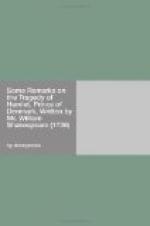and more likely to be taken with noble and sublime
Representations of such Incidents. I need not
observe, that the Vulgar cannot judge of the Historical
Propriety of a great Character, This is obvious to
every one; nor can they judge of the Passion of Ambition,
as it has Power with Princes and great Men, because
not being versed by Reading in parallel Stories, and
not being in such a Situation of Life, as to feel the
Torments of such Passions, they cannot certainly tell
whether such Things are represented with proper Circumstances,
and proper Consequences drawn from them. And
moreover, as all Men are by Nature more prone to some
Passions than to others, This must cause Variety of
Sentiments in relation to the same Piece. Besides
all this, we may be very certain that different Education,
different Degrees of Understanding, and of the Passions
common to all Men, must cause a Variety of Sentiments
concerning such Representations. To prove this,
let us observe how the Tastes of Nations differ in
relation to these Things; so much, that one would
be tempted sometimes to think, that they did not all
partake of the same Passions; but certainly they vary
in the Degrees of them; therefore by a Parity of Reason
we may justly conclude, that Difference of Education
among those of the same Nation must affect their Passions
and Sentiments. The better sort have (if one may
so express it) some acquired Passions which the lower
sort are ignorant of. Thus indeed it seems at
first Sight; but on a nearer View they are found to
be, as I said, the same Passions augmented or refined,
and turned upon other Objects. The different
Manner in which one of Corneille’s or
Racine’s Pieces would be received by an
Audience of Turks or Russians, and an
Audience of Frenchmen, (supposing the former
to understand the Language, and the latter to be free
from any national Prejudices for the Authors) is a
lively and strong Emblem of the Force of Education
and Custom among Creatures, all cast in the same Mould,
and endued with the same Faculties and Passions with
very little real Difference. Still farther, we
may observe, that even good Acting will recommend
some bad Pieces, as bad Acting will take away half
the Merit of good Ones; and some National Subjects
are pleasing (as the Albion Queens and Earl
of Essex) to the Many, tho’ they very
little affect the Few. When I speak of Plays,
I desire to be understood of Tragedies, in which I
think the English excell; for I can mention
very few of our Comedies with any Approbation; since
in the Latter, neither the Morals of the Inhabitants
of this Nation are regarded, or Nature followed.
In short, not to pursue a Subject, that would carry
me great Lengths, I conclude from this, that a Piece
which has no Merit in it but Nature, will please the
Vulgar; whereas exalted Sentiments, and Purity and
Nobleness of Diction, as well as Nature, are absolutely
requisite to please those of a true Taste. And




